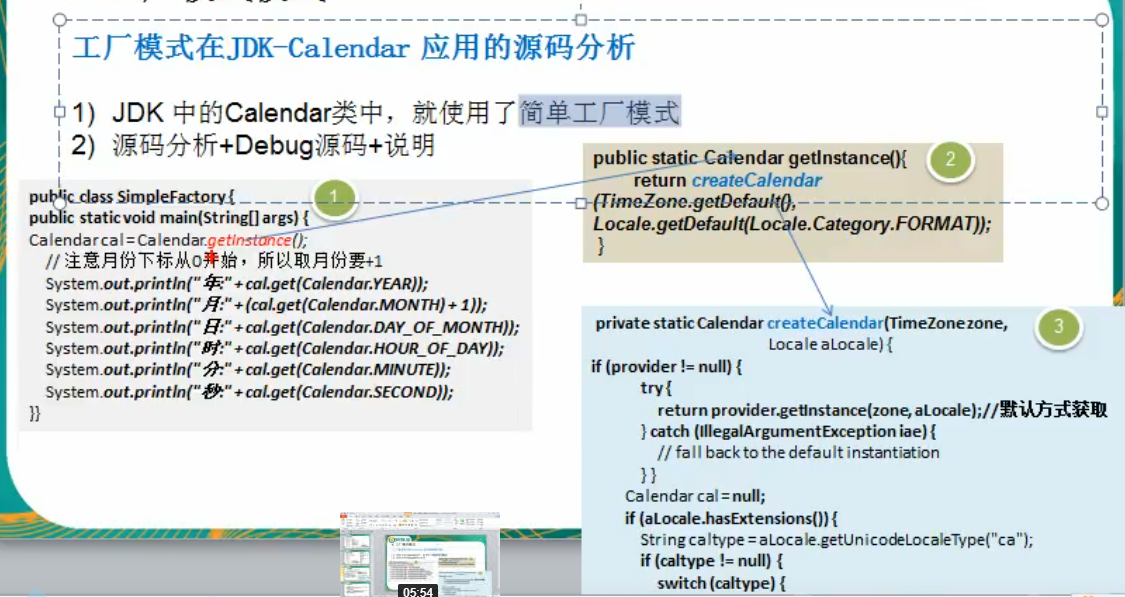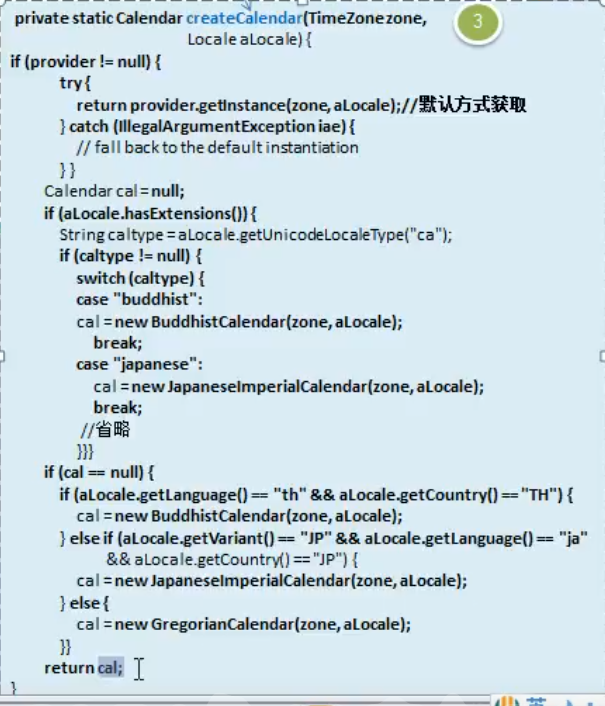工厂模式
JDK-Calendar的源码分析
JDK中的calendar类中,就使用了简单的工厂模式
源码分析+Debug源码+说明
如下图
package com.atguigu.factory.JDK;
import java.util.Calendar;
public class Factory {
public static void main(String[] args) {
// getInstance 是Calendar 静态方法
Calendar cal = Calendar.getInstance();
// 注意月份下标从0开始,所以要取月份要+1
System.out.println("年:"+cal.get(Calendar.YEAR));
System.out.println("月:"+cal.get(Calendar.MONTH)+1);
System.out.println("日:"+cal.get(Calendar.DAY_OF_MONTH));
System.out.println("时:"+cal.get(Calendar.HOUR_OF_DAY));
System.out.println("分:"+cal.get(Calendar.MINUTE));
System.out.println("秒:"+cal.get(Calendar.SECOND));
}
}
getInstance里面
/**
* Gets a calendar using the default time zone and locale. The
* <code>Calendar</code> returned is based on the current time
* in the default time zone with the default
* {@link Locale.Category#FORMAT FORMAT} locale.
*
* @return a Calendar.
*/
public static Calendar getInstance()
{
return createCalendar(TimeZone.getDefault(), Locale.getDefault(Locale.Category.FORMAT));
}
再往里走 createCalendar
private static Calendar createCalendar(TimeZone zone,
Locale aLocale)
// 这个地方 根据 在创建的时候 传入的值(TimeZone Locale)的不同 来决定
{
CalendarProvider provider =
LocaleProviderAdapter.getAdapter(CalendarProvider.class, aLocale)
.getCalendarProvider();
if (provider != null) {
try {
return provider.getInstance(zone, aLocale);
} catch (IllegalArgumentException iae) {
// fall back to the default instantiation
}
}
Calendar cal = null;
if (aLocale.hasExtensions()) {
String caltype = aLocale.getUnicodeLocaleType("ca");
if (caltype != null) {
switch (caltype) {
case "buddhist":
// 这里你看吧,他判断了,他判断了
// 根据不同的情况,来调用不同的方法
cal = new BuddhistCalendar(zone, aLocale);
break;
case "japanese":
// 返回对应的实例
cal = new JapaneseImperialCalendar(zone, aLocale);
break;
case "gregory":
// 有感兴趣的同学可以再往里面追一下源码
cal = new GregorianCalendar(zone, aLocale);
break;
}
}
}
if (cal == null) {
// If no known calendar type is explicitly specified,
// perform the traditional way to create a Calendar:
// create a BuddhistCalendar for th_TH locale,
// a JapaneseImperialCalendar for ja_JP_JP locale, or
// a GregorianCalendar for any other locales.
// NOTE: The language, country and variant strings are interned.
if (aLocale.getLanguage() == "th" && aLocale.getCountry() == "TH") {
cal = new BuddhistCalendar(zone, aLocale);
} else if (aLocale.getVariant() == "JP" && aLocale.getLanguage() == "ja"
&& aLocale.getCountry() == "JP") {
cal = new JapaneseImperialCalendar(zone, aLocale);
} else {
cal = new GregorianCalendar(zone, aLocale);
}
}
return cal;
}
工厂模式小结
工厂模式的意义 将实例化对象代码提取出来,放到一个类中统一管理和维护,达到和主项目的依赖关系的解耦.从而提高项目的扩展和维护性
三种工厂模式(简单工厂模式,工厂方法模式,抽象工厂模式)
设计模式的 依赖抽象 原则
创建对象实例的时候,不要直接new类,而是把这个new类的动作放在一个工厂的方法中,并返回. 也有的书上说,变量不要直接持有具体类的引用
- 不要让类继承具体类,而是继承抽象类或者实现interface(接口)
- 不要覆盖基类中已经实现的方法


